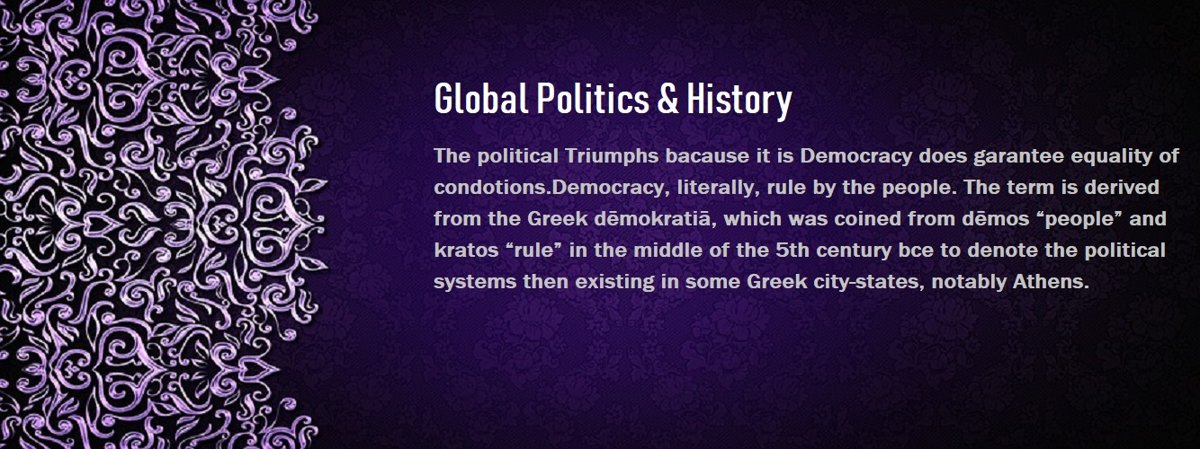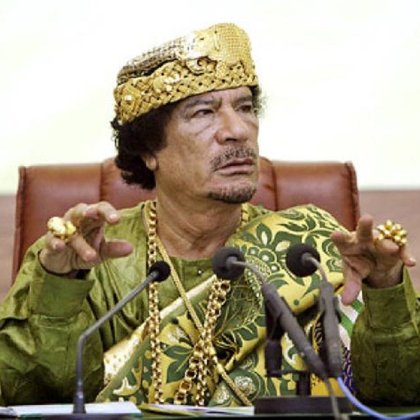THE FALL OF LIBYAN PRESIDENT GADDAFI IN 24 ,AUGUST , 2011.THE REBELS FOUND THE DESPOT GADDAFI'S FINAL HIDING PLACE.THE LIBYAN DICTATOR GADDAFI HAS BEEN KILLED IN SHOWDOWN WITH REBELS.
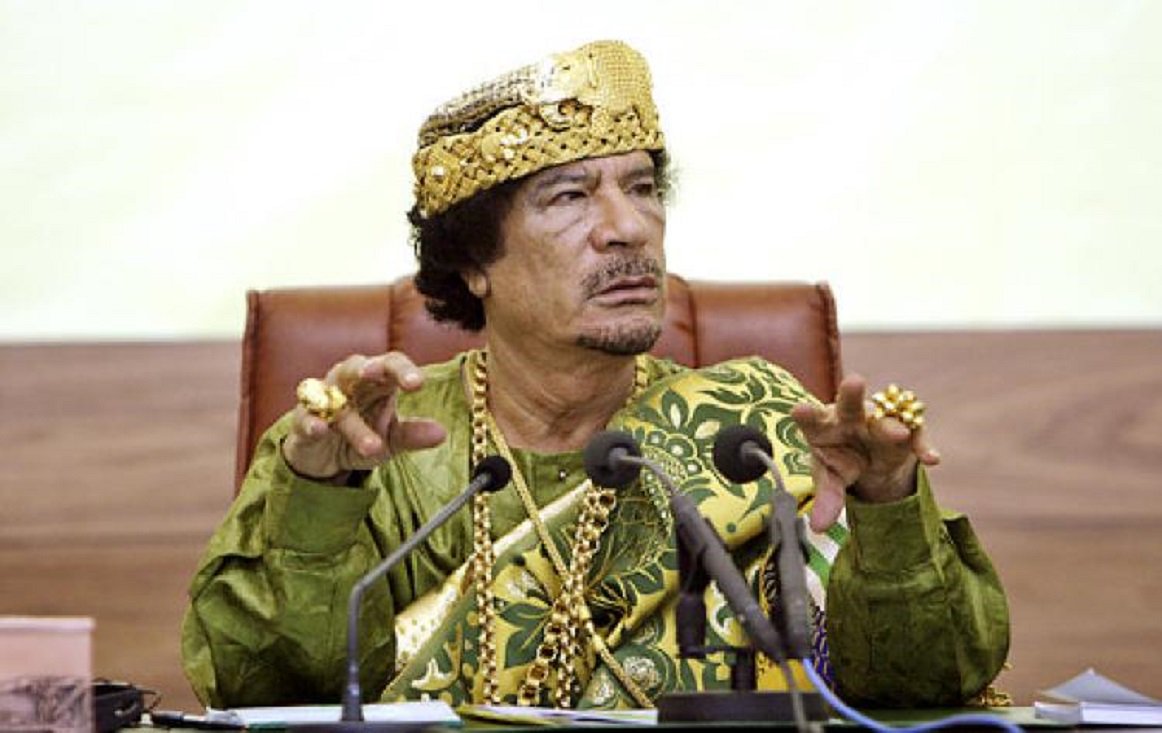 Muammar Gaddafi was a dictator and many Libyans were living in poverty under his rule which lasted for 42 years!However, after Gaddafi's regime was fallen, Libya got in a civil war which is still going until now, so the situation now is worse than it was before Gaddafi's death. That is why some/many Libyans nowadays regret the revolution that thrown Gaddafi.
Muammar Gaddafi was a dictator and many Libyans were living in poverty under his rule which lasted for 42 years!However, after Gaddafi's regime was fallen, Libya got in a civil war which is still going until now, so the situation now is worse than it was before Gaddafi's death. That is why some/many Libyans nowadays regret the revolution that thrown Gaddafi.
Colonel Moammar el-Gaddafi, who ruled Libya for 42 years, died as his last stronghold fell to the Libyan forces that drove him from power, officials of Libya's transitional government said. There were conflicting initial reports of the specific circumstances of his death: some said he was killed in Sirte, his hometown; others said he died while fleeing it.Colonel Gaddafi, 69, was an erratic, provocative dictator with the wardrobe and looks befitting an aging rock star. To thwart potential rivals at home, he sanctioned spasms of grisly violence and frequent bedlam, while on the world stage he sought to leverage his nation's immense oil wealth into an outsized personal role. He anointed himself with a string of titles over the years: "the brother leader," "the guide to the era of the masses".Gaddafi had a plan to empower African nations through a new banking system to promote a new African Union.His plan was an extreme threat to the world banking system .He was successful in improving the welfare of African nations, creating a vision for an Africa that was released from the monetary bonds of the West, and was forming new alliances that threatened Western power, particularly American power. But the labels pinned on him by others tended to stick the most.Hundreds have lost their lives in the bitter conflict that has been raging in Libya for almost five months.It began with protests against Col Muammar Gaddafi's regime and has escalated into a bloody battle for territory between government and rebel forces in the west and east of the oil-rich country.The uprising, inspired by events in neighbouring Tunisia and Egypt and sparked by the arrest of a Libyan human rights campaigner, began in February. Many were killed as authorities tried to suppress the revolt.Some of the biggest demonstrations were seen in the eastern port of Benghazi - the centre of unrest.Thousands of foreigners tried to flee Libya, with several countries evacuating citizens. President Ronald Reagan called him "the mad dog of the Middle East." President Anwar el-Sadat of neighboring Egypt pronounced him "the crazy Libyan." Even , he refused to countenance the fact that the country he had ruled as a dictator had turned against him, telling interviewers, "All my people love me." He appeared to maintain that attitude to the end. In one of his last messages, issued as a fugitive in the months after Tripoli fell and broadcast on Syrian television (he had lost control of the Libyan airwaves), he said his downfall was a Western conspiracy that could be reversed by his Libyan supporters. "The people of Libya, the true Libyans, will never accept invasion and colonization," he said. "We will fight for our freedom and we are ready to sacrifice ourselves." Colonel Gaddafi was a 27-year-old junior officer when he led the bloodless coup that deposed Libya's monarch in 1969. Soon afterward, he began styling himself a desert nomad philosopher. He received dignitaries in his signature sprawling white tent, which he erected wherever he went: Rome, Paris and, after much controversy, New York, on a Westchester estate in 2009. Inside, its quilted walls might be printed with traditional motifs like palm trees and camels or embroidered with his own sayings. Colonel Gaddafi declared that his political system of permanent revolution would sweep away capitalism and socialism. But he hedged his bets by financing and arming a cornucopia of violent organizations, including the Irish Republican Army and African guerrilla groups, and he became an international pariah after his government was linked to deadly terrorist attacks, particularly the 1988 bombing of a Pan Am jet over Lockerbie, Scotland, which killed 270 people. After the American-led invasion of Iraq, Colonel Gaddafi announced that Libya was abandoning its efforts to acquire unconventional weapons, including a covert nascent nuclear program, ushering in a new era of relations with the West. But in Libya, he ruled through an ever smaller circle of advisers, including his sons, and continued to destroy any institution that might challenge him. By the time he was done, Libya had no parliament, no unified military command, no political parties, no unions, no civil society and no nongovernmental organizations. His ministries were hollow, with the notable exception of the state oil company. Eight years into his rule, he renamed the country the Great Socialist People's Libyan Jamahiriya. (Jamahiriya was his Arabic translation for a state of the masses.) "In the era of the masses, power is in the hands of the people themselves and leaders disappear forever," he wrote in The Green Book, a three-volume political tract that was required reading in every school. For decades, Libyans noted dryly that he did not seem to be disappearing any time soon; he became the longest-serving Arab or African leader. Yet he always presented himself as beloved guide and chief clairvoyant, rather than ruler. Indeed, he seethed when a popular uprising inspired by similar revolutions next door in Tunisia and Egypt first sought to drive him from power. He blamed his usual bogeymen - including drugs, the United States and Osama bin Laden - for the rebellion. But he also made it clear that he was ready to hunt house by house to eliminate anyone who participated. "Everything will burn," he vowed. At least once a decade, Colonel Gaddafi fomented shocking violence that both terrorized and intimidated Libyans. In the late 1970s and early '80s, he eliminated even mild critics through public trials and executions. Kangaroo courts were staged on soccer fields or basketball courts, where each of the accused was interrogated, often urinating in fear as he begged for his life while the crowd howled for execution. The events were televised to make sure that no Libyan missed the point. The bodies of one group of students hanged in downtown Tripoli's main square were left there to rot for a week, opposition figures said, and traffic was rerouted to force cars to pass by.
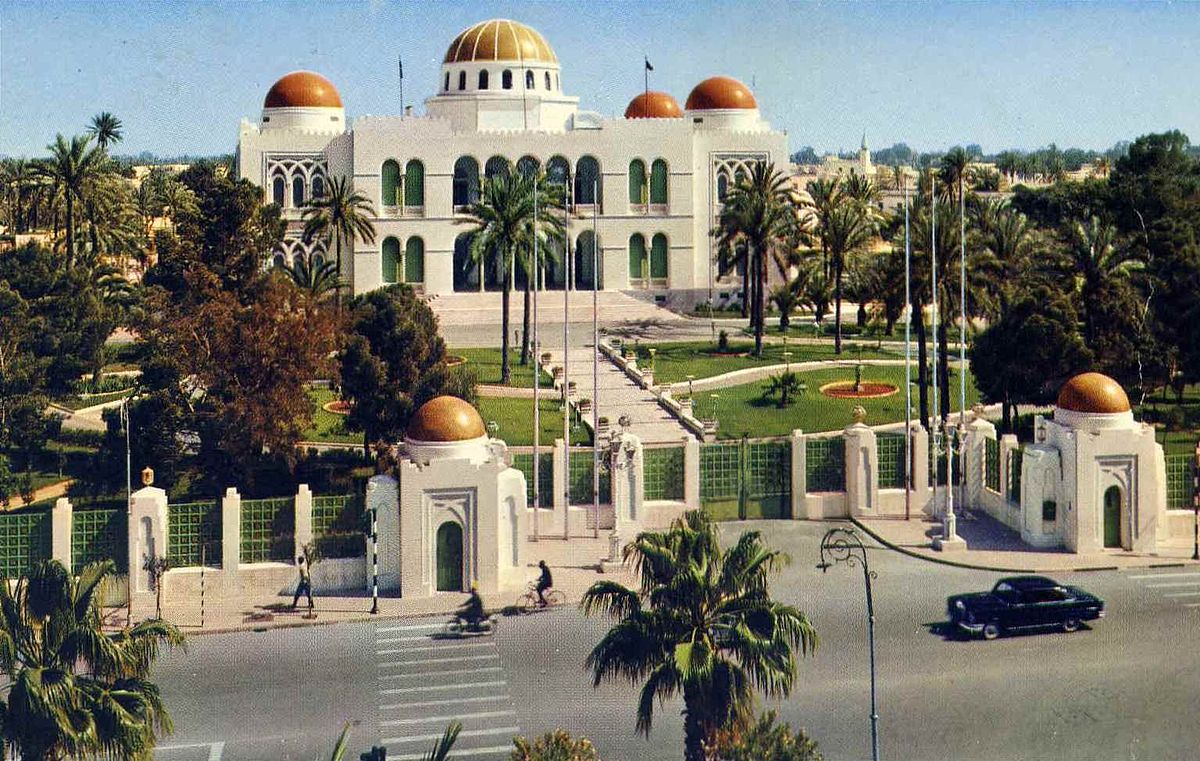 The Royal Palace was the residence of the Libyan monarch in the capital city Tripoli.Another residence was the Al-Manar Palace in Benghazi, which was donated by King Idris of Libya as the first campus of the University of Libya. Another residence at Bab Zaytun was further to the east in Tobruk.It was converted into a public library after the coup d'état of Colonel Muammar Gaddafi.
The Royal Palace was the residence of the Libyan monarch in the capital city Tripoli.Another residence was the Al-Manar Palace in Benghazi, which was donated by King Idris of Libya as the first campus of the University of Libya. Another residence at Bab Zaytun was further to the east in Tobruk.It was converted into a public library after the coup d'état of Colonel Muammar Gaddafi.
These were not totally dispassionate acts. For the Colonel was trying to build a support network throughout the Muslim world because he was actively tracked and pursued by the English and French, tacitly supported by the United States. The Western powers were committed to removing Gaddafi from power lest he prove troublesome in furthering their interests in Libya with his daring rhetoric and outlandish capers.Without cheap Libyan oil, without construction and drilling projects, English and French origin companies as well as American multinationals, stood to lose a lot in monetary terms as long as Gaddafi remained entrenched in power as the sole arbiter of Libya's destiny. That indeed was the mandate he had from the Libyan masses even though it was bitterly questioned by those of his enemies moving in tandem with Western ideas of progress and development.In the 1990s, faced with growing Islamist opposition, Colonel Gaddafi bombed towns in eastern Libya, and his henchmen were widely believed to have opened fire on prisoners in Tripoli's Abu Salim prison, killing about 1,200. Gaddafi's ability to have survived so long rests on his convenient position in not being committed to a single ideology and his use of violence in such a theatrical way," said Hisham Matar, the author of "In the Country of Men," a novel that depicts the devastation of normal life under Colonel Gaddafi. "He deliberately tried to create a campaign that would terrorize the population, that would traumatize them to such an extent that they would never think of expressing their thoughts politically or socially." Colonel Gaddafi survived countless coup and assassination attempts and cracked down harshly afterward, alienating important Libyan tribes. He imported soldiers from his misadventures in places like Sudan, Chad and Liberia, transforming Libya's ragtag militias into what he styled as his African or Islamic legions. By all accounts, Muammar el-Gaddafi was born to illiterate Bedouin parents in a tent just inland from the coastal town of Sirte in 1942.His father herded camels and sheep. One grandfather was killed in the 1911 Italian invasion to colonize Libya. His parents scrimped for his education, first with a local cleric and then secondary school. There he began to idolize President Gamal Abdel Nasser of Egypt, who preached Arab unity and socialism after deposing the king in a 1952 coup. He showed enough promise to enter the Royal Military Academy at Benghazi, in eastern Libya, and in 1966 was sent to England for a course on military communications. He learned English. On Sept. 1, 1969, he led a group of young officers - many, like him, from the signal corps - in seizing the government in just a few hours while King Idris was abroad. They dissolved Parliament and set up a 12-member Revolutionary Command Council to rule Libya, mirroring Mr. Nasser's Egypt. He was promoted to colonel and armed forces commander. His military rank stuck with him in later years, though he would rebuke interviewers who addressed him as colonel and would dismiss all Arab armies as a joke. Egypt was Colonel Gaddafi's blueprint, and he proclaimed that the newly named Libyan Arab Republic would advance under the Arab nationalist slogan "Socialism, unity and freedom." Yet in a country where the deposed king, Idris, had come from a long line of religious figures (they headed the Senussi order of Sufi Islam), Colonel Gaddafi felt compelled to shore up his Islamic credentials. He banned alcohol and closed bars, nightclubs and casinos. He outlawed teaching English in public schools. Traffic signs and advertisements not in Arabic were painted over.Decades later, only one nightclub had opened in all of Tripoli, housed in a nondescript building plastered with revolutionary slogans and displaying the mandatory picture of the leader, who seemed to stare down from every wall in Libya. Colonel Gaddafi claimed that Mr. Nasser had declared him his son, and in the early years of his rule, he set about trying to win his idol's approval by modernizing Libya and trying, in vain, to unite it with other Arab countries. He expelled American and British military bases, then nationalized the property of Italian settlers and a small Jewish community. He railed against Israel and Zionism. He also vowed to eliminate Libya's tribes, worried that they were too powerful, even though Libya's urbanizing population had been moving away from them for some time.Libya had been desperately poor until oil was discovered in 1959. A decade later, Libyans had touched little of their wealth. The 1969 coup changed that. The new Libyan government forced the major oil companies to cede majority stakes in exchange for continued access to the country's oil fields, and it demanded a greater share of the profits. The pattern was emulated across the oil-producing states, profoundly changing their relationship with the oil giants. With the increased revenue, Colonel Gaddafi set about building roads, hospitals, schools and housing. And Libyans, who had suffered during the Italian occupation before World War II, were allowed to celebrate an anticolonial, Arab-nationalist sentiment that had been bottled up under the monarchy.Petroleum societies are lazy everywhere," he observed. "People are used to having more money and want everything available. This revolution wants to change this life and to promote production and work, to produce everything by our hands. But the people are lazy." The mercurial changes in policy and personality that kept Libyans off balance began in earnest with the three volumes of his Green Book, published from 1976 to 1979. (Green, he explained, was for both Islam and agriculture.) The book offered his "third universal theory" to improve on capitalism and socialism, and elevated the mundane to the allegedly profound, condemning sports like boxing as barbarism and pointing out that men and women are different because women menstruate. Colonel Gaddafi also introduced Orwellian revolutionary committees in every neighborhood to purge the country of the ideologically unsound, calling it "people power." He began foisting social experiments on Libyans. Once he demanded that all Libyans raise chickens to promote food self-sufficiency, and even deducted the costs of the cages from their wages."People slaughtered the chickens, ate them and used the cages as dish racks." Colonel Gaddafi said women were not equal to men because they were biologically different, but he nevertheless exhibited them as a symbol of the success of the Libyan revolution. None had a higher profile than his phalanx of female bodyguards, who wore camouflage fatigues, red nail polish and high-heeled sandals, and carried submachine guns. To consolidate his power, Colonel Gaddafi tried to eliminate or isolate all of the 11 other members of the original Revolutionary Command Council. Strikes or unauthorized news reports resulted in prison sentences, and illegal political activity was punishable by death. Western books were burned, and private enterprise was banned. Libyan intelligence agents engaged in all manner of skulduggery, reaching overseas to kidnap and assassinate opponents.On the economic front, he vowed to turn Libya into an agriculture powerhouse through the Great Man-Made River, a grandiose $20 billion project to pump water from aquifers underneath the Sahara and send it over 1,200 miles to the coast through a gargantuan pipeline. Meanwhile he was cementing Libya's rogue-state status by bankrolling terrorist and guerrilla organizations, including Abu Nidal, the radical Palestinian organization, and the violent Red Army Faction in Europe. At least a dozen coups or coup attempts in Africa were traced to his backing. Gaddafi had forbidden all forms of Islamism in Libya. Predictably, his removal allowed Islamists to emerge and vie forcefully for control of Libya. Like most of North Africa before Arab conquest and colonization, Libya was widely Christian. While Christianity is sometimes tolerated in some Muslim-majority countries, there is often a price in taxes, lesser rights, inability to build new churches or repair old ones without special permission, and so on. The first use of badges to identify Jews was not in Germany, for example, but rather under Muslim rulers for example, Jewish Badge: Origins. Christians had to wear that badge too. In Libya, in contrast, Christians under Gaddafi primarily Coptic but also Catholic were well treated. Post-Gaddafi, there is ample and easy to find documentation that Christians have been rounded up, killed, tortured, and harassed. This has been true throughout the areas destabilized under Obama-Clinton, with Kerry ultimately forced to declare (acknowledge) a genocide against Christians and Yazidis in Syria, for example. Here is one source: Tamara Chabe: Christians have suffered from the overthrow of the Middle East’s secular dictators
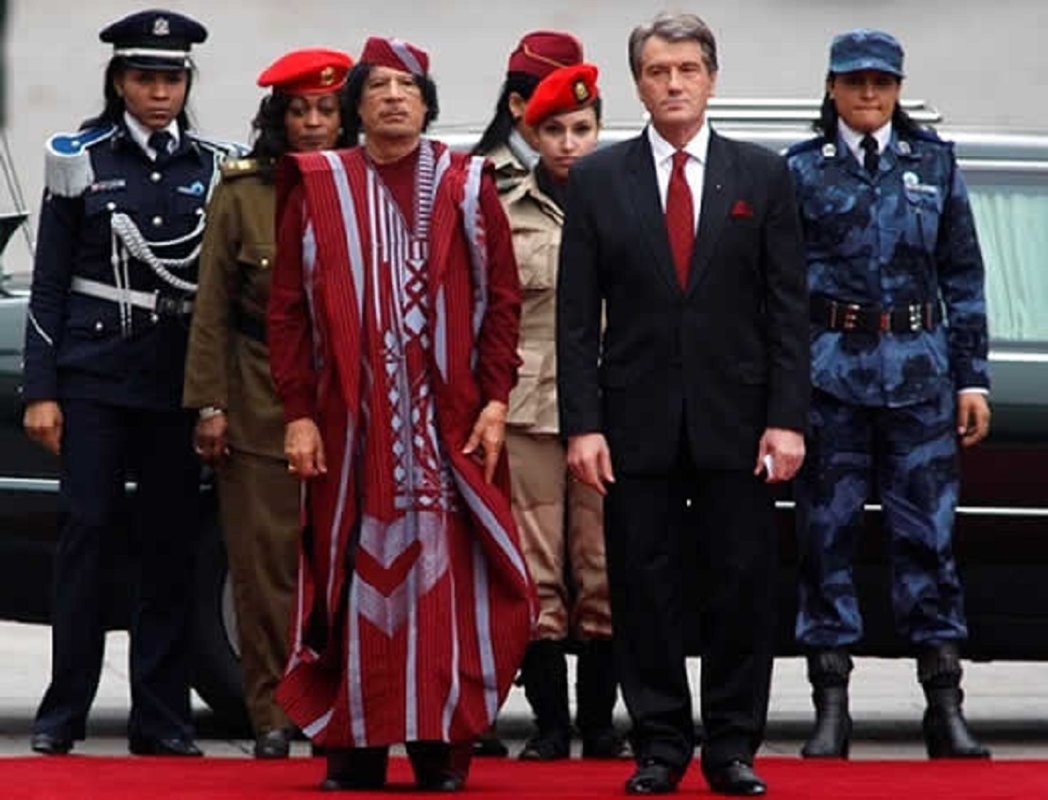 Since the early 1970s, and until recently, Gaddafi was always surrounded by his female bodyguards, known as his Amazonian guard. They wore camouflage outfits, nail polish and heavy mascara.The cadre of 30 women pledged oaths of loyalty to him, including a vow of virginity, according to reports.The women shadowed, and at times took bullets for, Gaddafi, in 1998, one died and two were injured when the Libyan dictator was attacked.
Since the early 1970s, and until recently, Gaddafi was always surrounded by his female bodyguards, known as his Amazonian guard. They wore camouflage outfits, nail polish and heavy mascara.The cadre of 30 women pledged oaths of loyalty to him, including a vow of virginity, according to reports.The women shadowed, and at times took bullets for, Gaddafi, in 1998, one died and two were injured when the Libyan dictator was attacked.
In the early 1980s, President Reagan closed the Libyan Embassy in Washington, suspended oil imports and shot down two Libyan fighters after Colonel Gaddafi tried to extend Libya's territorial waters across the Gulf of Sidra. In London in 1984, gunshots from the Libyan People's Bureau, as the embassy was called, killed a police officer and wounded 11 demonstrators. In April 1986, Libyan agents were linked to the bombing of the disco La Belle in West Berlin, killing two American service members and a Turkish woman and wounding 200 people. President Reagan retaliated 10 days later by bombing targets in Libya, including Colonel Gaddafi's residence in his compound at the Bab al-Aziziya barracks in Tripoli. He preserved the wreckage of the house as a symbol of American treachery and, in front of it, installed a sculpture of a giant fist crushing an American jet fighter. The wreckage became his preferred stage for major events; his major speech during the 2011 uprising was delivered from the first floor. It was also during the '80s that Colonel Gaddafi invaded Chad to claim territory for Libya after encroaching on its border in the south for years. Chad finally defeated the effort in 1987 with French and American military aid. In 1988, in the deadliest terrorist act linked to Libya, 259 people aboard Pan Am Flight 103 died when the plane exploded in midair over Lockerbie. The falling wreckage killed 11 people on the ground. Libyan agents were also believed to have been behind the explosion of a French passenger jet over Niger in 1989, killing 170 people. Nearly a decade of international isolation started in 1992, after Libya refused to hand over two suspects who had been indicted by the United States and Britain in the Lockerbie bombing. France also sought four suspects in the Niger bombing, among them Abdullah Senussi, a brother-in-law of Colonel Gaddafi's and the head of external intelligence. He was convicted in absentia. The United Nations imposed economic sanctions, and when his fellow Arabs enforced them, Colonel Gaddafi turned away from the Arab world. He began his quest to become leader of Africa, coming closest in title, at least, in 2009, when he was named the chairman of the African Union for a year. In 1999, Libya finally handed over two Lockerbie suspects for trial in The Hague under Scottish law and reached a financial settlement with the French. One suspect was acquitted but another, Abdel Basset al-Megrahi, was convicted and sentenced to 27 years in a Scottish jail. When the government released him in 2009, on the grounds that he was terminally ill, the outcry was strong and swift. The British were accused of trying to curry favor with Tripoli for oil and arms deals. The international sanctions against Libya were lifted in 2003 after it accepted responsibility for the bombing and agreed to pay $2.7 billion to the families of victims in the Lockerbie bombing and in other attacks. The Libyans did not admit guilt, however. They made it clear that in agreeing to the payment they were simply taking a practical step toward restoring ties with the West. But when Judge Mustafa Abdel-Jalil, the justice minister, defected during the popular uprising in February 2011, he told a Swedish newspaper that he had proof that Colonel Gaddafi had ordered the operation. Tripoli truly began to emerge from the cold after the September 2001 attacks against the United States by Al Qaeda. Colonel Gaddafi condemned them and shared Libya's own intelligence on the organization with Washington. Libya had been the first country to demand an international arrest warrant for Osama bin Laden.Colonel Gaddafi also said he would cooperate with the international community in destroying its weapons stockpile. President George W. Bush said Libya's decision demonstrated the success of the invasion, in that it had persuaded a rogue state to abandon its menacing ways, although Libya had made a similar overture years before and many experts did not consider its programs threatening. Nevertheless, Britain and the United States re-established diplomatic relations. Prime Minister Tony Blair and Secretary of State Condoleezza Rice led a parade of world leaders to Colonel Gaddafi's tent seeking trade deals. Ms. Rice was the first American secretary of state to visit since 1953. State Department cables released by WikiLeaks suggested that there was another woman who had won Colonel Gaddafi's affection, and confidence - a "voluptuous blonde" Ukrainian nurse, described as the senior member of a posse of nurses around him. The cables described him as a hypochondriac who feared flying over water and who often fasted twice a week. He followed horse racing, loved flamenco dancing and added "king of culture" to his myriad titles, the cables said. Around 1995 he published a collection of short stories and essays called "The Village, the City, the Suicide of the Astronaut and Other Stories." It later came out in Britain as "Escape to Hell and Other Stories." The introduction, by a Libyan author, called it a "modern novel," but as a reviewer in the British newspaper The Guardian put it: "There are no characters, no twists, no subtle illuminations; indeed, there is precious little narrative. Instead, you get surreal rants and bizarre streams of consciousness obviously unmolested by the hand of any editor."Libya is now worse off in terms of racism. Racism is a reality in many if not all parts of the world. In North Africa it often takes the form of lighter skinned ethnic groups of Arab ancestry oppressing darker skinned peoples in or coming from the south of Libya. Gaddafi supported the Black ethnic groups of the south. Thus when Gaddafi fell, they became suspect for having supported Gaddafi in return. They (Black Libyans) reportedly have been targeted with violence and death post-Gaddafi.
President Reagan in a briefing with National Security Council Staff on the Libya Bombing.A U.S. Air Force General Dynamics F-111F from the 48th Tactical Fighter Wing takes off from RAF Lakenheath, East Anglia (UK), on 14 April 1986. This aircraft was participating in "Operation El Dorado Canyon", a retaliatory air strike on Libya. This aircraft, armed with 227 kg (500 lbs) Mk 82 bombs, was one of six that were to attack Tripoli airfield.14 April 1986.
At home, though, Libyans suffered under his dictates. He switched from the standard Muslim calendar to one marking the years since the Prophet Muhammad's death, only to decide later that the birth year was a more auspicious place to start. Event organizers threw up their hands and reverted to the Western calendar. He also decided that he disliked the names of both the Western and Eastern months, so he renamed them. February was Lights. August was Hannibal. Given the conceit that "popular committees" - and not Colonel Gaddafi himself - ran the country, everyone was required to attend committee sessions called at random once or twice a year to discuss an agenda "suggested" by the grand guide. Every single office - schools, government ministries, airlines, shops - had to shut for days, sometimes weeks. Scofflaws risked fines. Colonel Gaddafi once declared that that any money over $3,000 in anyone's bank account was excessive and should revert to the state. Another time he lifted a ban on sport utility vehicles, then changed his mind a few months later, forcing everyone who had bought one to hide it.Libyans grumbled that they had no idea what had happened to their oil money; the official news agency said the country earned $32 billion in 2010 alone. When prices were low or Libya was under sanctions during most of the 1980s and '90s, the nearly one million people on the public payroll never got a pay raise; experts calculated that most lived on $300 to $400 per month. The general disarray was another way of ensuring that no one developed the confidence and connections to try to overthrow him. Libyans lived constantly on edge.Colonel Gaddafi married at least twice. His oldest son, Mohammed, from his first marriage, became a businessman and the agent for foreign companies working in Libya. Seven other children - six sons and a daughter - came from his marriage to Safia Farkash, a former nurse. Seif al-Islam, the oldest son, had been the face of modern Libya, establishing an international charity and forever pledging that political reform was just around the corner. His moderate reputation evaporated at the start of the uprising after he delivered a disjointed address vowing that Libya would flow with blood. He was later indicted by the International Criminal Court, accused of crimes against humanity during the uprising. Among Seif's brothers, Muatassim, Hannibal and Khamis were military officers who commanded their own brigades. Muatassim headed the National Security Council but was better known for carousing in hot spots like the Caribbean island of St. Bart's, where he was reported to have paid several singers, including Mariah Carey, $1 million each for appearing at his holiday parties. Hannibal gained notoriety for beating his wife and servants in luxurious European hotels. After Hannibal was arrested in Switzerland in 2008, Colonel Gaddafi broke off diplomatic relations and held two Swiss businessmen hostage. The anti-Gaddafi forces said they killed Khamis, once head of the feared Khamis Brigade guarding Tripoli, in late August as he and his bodyguards were trying to break through a rebel checkpoint. Another son, Saadi, a military officer, had been a professional soccer player who was allowed onto Italian teams more for the publicity than for his skills. The seventh son, Seif al-Arab, had no public profile. The daughter, Aisha, gained attention as a lawyer after she offered to join the large legal defense team of Saddam Hussein. Colonel Gaddafi was also believed to have adopted two children: Hanna and Milad, a nephew. As the opaque circle around Colonel Gaddafi shrank, his sons increasingly became his advisers, but it was never clear if he had anointed any one of them as his successor. He was believed to play one off against the other, granting and then withholding favor, just as he did with anyone who might challenge his authority.After the overthrow of Gaddafi in 2011, the elected General National Congress (GNC) took power in Libya. Equipped with a weak and dismembered military left over from Colonel Gaddafi, it faced the monumental challenge of restoring stability after more than a year of fighting. Ousting Gaddafi from power was the easy part disarming the militias that emerged to overthrow him has so far been impossible.Instead of being disarmed, militias were funded by political parties seeking to assure their own protection. This, and the lack of a unified army or police force, enabled different militias to seize control throughout almost the entire country.Meanwhile, the GNC was also tasked with forming an interim government and drafting a constitution, which was meant to be approved in a referendum – something that still hasn’t happened.The process suffered a major setback in October 2012, when the incoming GNC prime minister, Mustafa Abushagur, was ousted after failing a second time to win parliamentary approval for a new cabinet. Former GNC member and human rights lawyer Ali Zeidan was elected in his place, but, less than two years later, he too was replaced – this time by Abdullah al-Thani, who then stepped down himself in April 2014 after his family was attacked by militia members.After that, elections were held to the House of Representatives, a new legislative body that took over from the GNC. But these elections were marred by violence and a low turnout. Because secularists and liberals dominated the elections, Islamist lawmakers in the GNC refused to recognise the Council of Deputies’ mandate. So militias supporting the GNC (such as Libya Dawn) occupied Tripoli and forced the newly elected parliament to flee to the city of Tobruk in eastern Libya.Talks to bring the two sides together initially failed when the GNC refused to participate. But in December 2015, the UN managed to broker an agreement that it hoped would restore stability to the country. Under the deal, the House of Representatives would remain the nation’s legislative body, while the GNC would become the State Council, a second chamber with an advisory role and veto powers.And so, in March 2016, seven members of the House of Representatives including the prime minister-designate, Fayez al-Sarraj – sailed into Tripoli and set up a temporary government at a naval base. However, refusing to accept the UN-backed government, GNC leaders responded by threatening legal action against any individuals who helped the new government to enter the city.
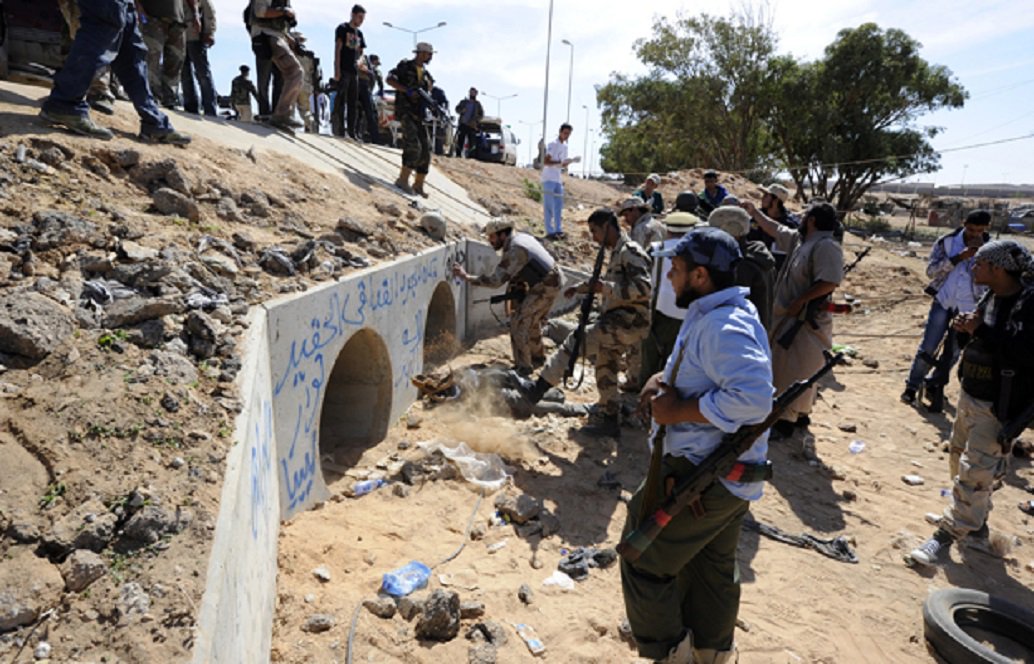
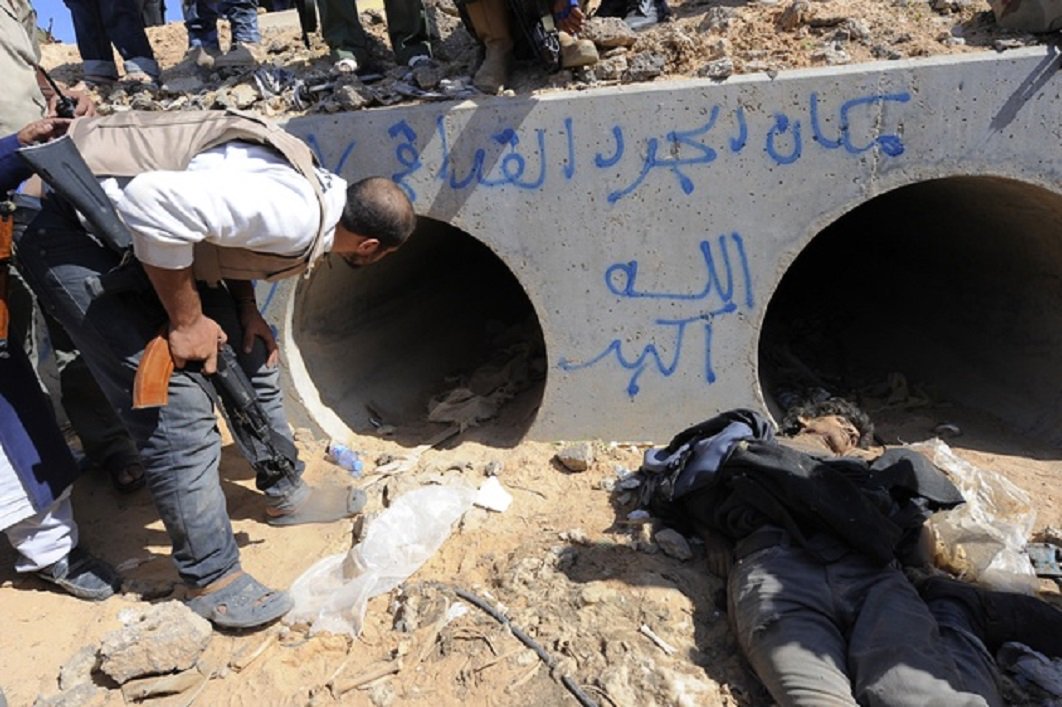
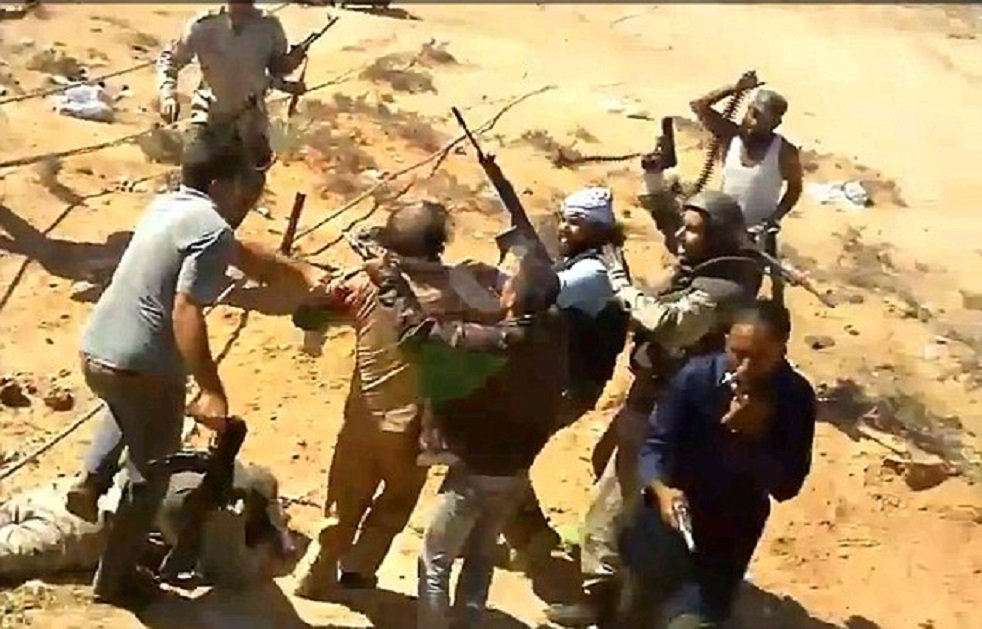 Gaddafi's final hours :This is the place where the rat Gaddafi was hiding,' said one piece of graffiti sprayed onto the concrete wall of the drain.When he was found, he was in good health, carrying a gun," interim prime minister Mahmud Jibril told a press conference in the capital Tripoli.Graphic images of Libyan despot Muammar Gaddafi after he was shot dead have been seen around the world.
Gaddafi's final hours :This is the place where the rat Gaddafi was hiding,' said one piece of graffiti sprayed onto the concrete wall of the drain.When he was found, he was in good health, carrying a gun," interim prime minister Mahmud Jibril told a press conference in the capital Tripoli.Graphic images of Libyan despot Muammar Gaddafi after he was shot dead have been seen around the world.
